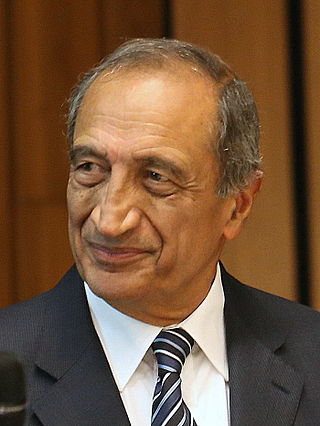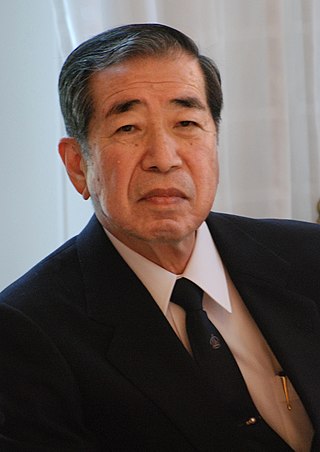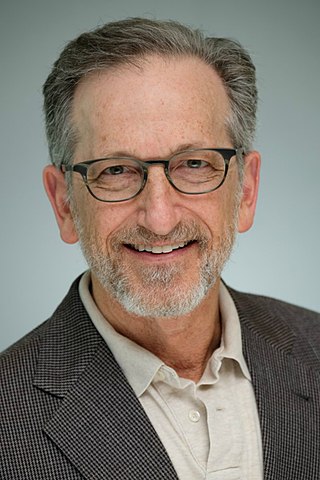
Rheumatoid arthritis (RA) is a long-term autoimmune disorder that primarily affects joints. It typically results in warm, swollen, and painful joints. Pain and stiffness often worsen following rest. Most commonly, the wrist and hands are involved, with the same joints typically involved on both sides of the body. The disease may also affect other parts of the body, including skin, eyes, lungs, heart, nerves, and blood. This may result in a low red blood cell count, inflammation around the lungs, and inflammation around the heart. Fever and low energy may also be present. Often, symptoms come on gradually over weeks to months.
The National Institute of Arthritis and Musculoskeletal and Skin Diseases (NIAMS) is one of the institutes and centers that make up the National Institutes of Health, an agency of the United States Department of Health and Human Services (HHS).
Rheumatoid factor (RF) is the autoantibody that was first found in rheumatoid arthritis. It is defined as an antibody against the Fc portion of IgG and different RFs can recognize different parts of the IgG-Fc. RF and IgG join to form immune complexes that contribute to the disease process such as chronic inflammation and joint destruction at the synovium and cartilage.

Sir Ravinder Nath Maini is an Indian-born British rheumatologist and academic who is an emeritus professor at Imperial College London. He led the Kennedy Institute of Rheumatology.

Tadamitsu Kishimoto is a Japanese immunologist known for research on IgM and cytokines, most famously, interleukin 6.

HLA-DR1 (DR1) is a HLA-DR serotype that recognizes the DRB1*01 gene products. It has been observed to be common among centenarians.

Deoxyribonuclease gamma is an enzyme that in humans is encoded by the DNASE1L3 gene. This gene's is located on chromosome 3's "p arm", i.e., short arm, between region 1, band 4, sub-band 3 and region 2, band 1, sub-band 1
The Dr. Paul Janssen Award for Biomedical Research is given annually by Johnson & Johnson to honor the work of an active scientist in academia, industry or a scientific institute in the field of biomedical research. It was established in 2004 and perpetuates the memory of Paul Janssen, the founder of Janssen Pharmaceutica, a Johnson & Johnson subsidiary.
Sir Marc Feldmann is an Australian-educated British immunologist. He is a professor at the University of Oxford and a senior research fellow at Somerville College, Oxford.
B K Thelma commonly known as Bittianda Kuttapa Thelma is a professor in the Department of Genetics at the University of Delhi, South Campus, New Delhi, India. She is the Principal investigator and Co-ordinator of the Centre of excellence on Genomes Sciences and Predictive Medicine funded by the Govt. of India. She is also the Co-ordinator of a major project on newborn screening for inborn errors of metabolism in Delhi state which aims to demonstrate the feasibility of mandatory screening of newborns in the country and to generate epidemiological data for the testable IEMs in the genetically distinct Indian population, for the first time.
Terri H. Finkel is an American pediatric rheumatologist and immunologist who is the Children's Foundation of Memphis Endowed Chair and tenured professor of pediatrics at the University of Tennessee Health Science Center and St. Jude Children's Research Hospital. Previously, she was the pediatrician-in-chief, chair of pediatrics and chief scientific officer at Nemours Children's Hospital. She is known for her research into autoimmunity, AIDS, juvenile rheumatoid arthritis, lupus, and cancer. Her work has been recognized in more than 200 publications, 10 U.S. patents, and 4 licensed technologies. Finkel has been placed in the top one percent of American pediatric rheumatologists by U.S. News & World Report. Her numerous honors include being named among America's Top Doctors by Castle Connolly every year since 2011 and induction into the Colorado Women's Hall of Fame in 1996.

Narinder Kumar Mehra is an Indian immunologist, head of the department of transplant immunology and immunogenetics of the SRL Limited, Gurgaon. He is a former dean of research and holds the ICMR Dr. C.G. Pandit National Chair at AIIMS. An elected fellow of the International Medical Sciences Academy, The World Academy of Sciences, Indian National Science Academy and National Academy of Sciences, India, Mehra is known for his research on histocompatibility and immunogenetics. The Council of Scientific and Industrial Research, the apex agency of the Government of India for scientific research, awarded him the Shanti Swarup Bhatnagar Prize for Science and Technology, one of the highest Indian science awards for his contributions to Medical Sciences in 1992. He received the Chevalier of the National Order of Merit from François Mitterrand in 2003.

Gary S. Firestein is an American rheumatologist, professor, and founding director of the Altman Clinical and Translational Research Institute (ACTRI) at the University of California San Diego and Senior Associate Vice Chancellor for Health Sciences at University of California, San Diego.
Paul-Peter Tak is a Dutch immunologist and academic specialising in the fields of internal medicine, rheumatology and immunology. Tak has been the President & CEO of Candel Therapeutics since September 2020.

Lars Klareskog is a Swedish physician, immunologist, and rheumatologist, known for research into the genetics of autoimmune diseases such as rheumatoid arthritis (RA).

Soumya Raychaudhuri is a professor of medicine and biomedical informatics at Harvard Medical School, and an Institute Member at Broad Institute. He is the JS Coblyn and MB Brenner Distinguished Chair in Rheumatology/Immunology and a practicing rheumatologist at Brigham and Women's Hospital. He is the director for the Center for Data Sciences at Brigham and Harvard. His research focuses on human genetics and computational genomics to understand immune-mediated diseases.

Lindsey A. Criswell is an American rheumatologist and physician-scientist. She is director of the National Institute of Arthritis and Musculoskeletal and Skin Diseases. Criswell was vice chancellor of research at University of California, San Francisco where she held the Jean S. Engleman Distinguished Professorship in Rheumatology.

Oscar Segurado is a medical researcher and academician. He holds a tenured professorship of Immunology at the University of León, Spain. Segurado has conducted research in the domains of Rheumatology and Immunology. His scientific work focuses on Rheumatoid arthritis.
Josef Smolen is an Austrian rheumatologist and immunologist and professor emeritus at the Medical University of Vienna. Since 2018, he is chairman emeritus of the Department of Internal Medicine 3 and the Division of Rheumatology at the Medical University of Vienna and Vienna General Hospital and was the chairman of the 2nd Medical Department and Center for Diagnosis and Therapy of Rheumatic Diseases at the Lainz Hospital, now the Hietzing Clinic of the Vienna Health Association from 1989 to 2017.

Robert J. Winchester is an American physician known for his research on the genetic predisposition to rheumatoid arthritis, systemic lupus erythematosus, and other autoimmune diseases.












